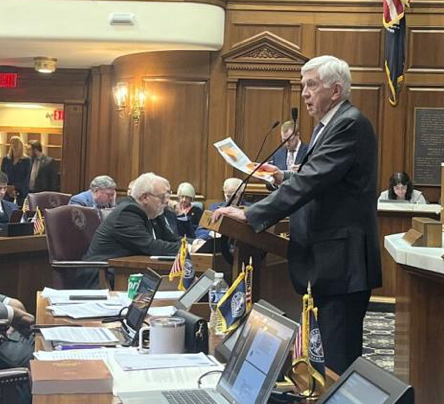INDIANAPOLIS—Monday was the Indiana House’s deadline to pass bills on to the Senate—any bills that were not heard by the chamber are now dead. That includes the bill to allow school board elections to be partisan, which saw a lot of concern during committee meetings.

Discussion on pension investments took up significant time during the House meeting Monday. House Bill 1008, considered an anti-ESG bill, works to change Indiana pension laws. The bill would make it so that businesses that use ESG factors in decision making cannot involve themselves with the state’s pension system. According to the Corporate Financial Institute, ESG is a framework “that helps stakeholders understand how an organization is managing risks and opportunities related to environmental, social, and governance criteria.â€
Essentially, ESG is used to look at investments for more than just their returns. It takes social and environmental issues into account as well.
This bill also works to protect companies in controversial industries, such as gun manufacturers, in the case that they are discriminated against.
HB 1008’s author, Rep. Ethan Manning, R-Logansport, created the bill because he said the Indiana Public Retirement System needs to focus on the financial side of things.
“What we’re saying is, you can’t institute these quotas and things on corporate boards without having a financial reason for doing so,†Manning said.
Various Democratic lawmakers brought forward concerns with the bill.
Rep. Matt Pierce, D-Bloomington, said, “By voting through this bill, you’re going to say it’s the policy of this state to protect firearm manufacturers and fossil fuel companies while prohibiting anything that would prevent, in the corporate setting, discrimination against all the people that have suffered discrimination in the past.â€
Rep. Ed Delaney, D-Indianapolis, said that the bill avoids real issues for Hoosier workers.
“I’m the first one this session to stand up and say, ‘Maybe we ought to look at the benefits [for Hoosier workers] and see if they’re adequate.’ No, that’s not a topic of interest,†Delaney said. “The interest is when there’s some company that didn’t get investment that we would like to get investment. Why don’t we do our job?â€
The bill ultimately received a passing vote of 66-30 and will now move to the Senate.
Ashlyn Myers is a reporter for TheStatehouseFile.com, a news website powered by Franklin College journalism students.





